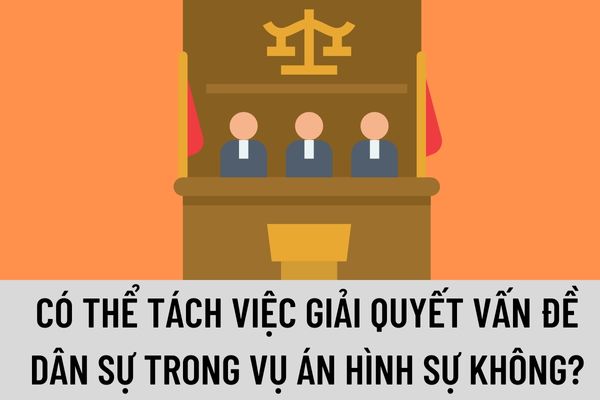Can Civil Matters Be Separated from a Criminal Case to Be Resolved According to Civil Procedure?
Is it possible to separate the resolution of civil matters in a criminal case to be addressed under civil procedure?
Based on Article 30 of the Criminal Procedure Code 2015, the regulations are as follows:
Resolution of civil matters in criminal cases
The resolution of civil matters in criminal cases is conducted alongside the resolution of the criminal case. In cases where the criminal case involves resolving issues of compensation for damages or restitution and there are not yet conditions for verification, and resolving the civil issue does not affect the resolution of the criminal case, the civil matter can be separated to be resolved under civil procedures.
It is possible to separate the resolution of civil matters in a criminal case to be addressed under civil procedures in cases where the criminal case involves resolving issues of compensation for damages or restitution and there are not yet conditions for verification, and resolving the civil issue does not affect the resolution of the criminal case.

Is it possible to separate the resolution of civil matters in a criminal case to be addressed under civil procedure?
How is the procedure for accepting the resolution of criminal cases concerning civil matters guided?
According to sub-section 2, Section III of Official Dispatch 121/2003/KHXX, the procedures for accepting the resolution of criminal cases concerning civil matters are guided as follows:
- In cases where the trial court of first instance, appellate court, court of cassation, or reexamination decides to separate the civil part of a criminal case to be resolved as a civil case under civil procedure, when requested according to the corresponding points and sections of Part II of this Official Dispatch, the court only accepts the handling of civil matters if the involved parties request it (with a request application or lawsuit petition). The acceptance and handling of the case are conducted under the general procedures as prescribed in the Ordinance on Procedures for Resolving Civil Cases.
- In cases where the court of first instance decides to return the case file for further investigation or the appellate court, court of cassation, or reexamination decides to conduct the proceedings again from the investigation stage as guided at the corresponding points and sections of Part II of this Official Dispatch, then upon receiving the file transferred by the Procuracy, the court of first instance accepts and prepares to hear the case according to the general procedures prescribed in the Criminal Procedure Code.
Thus, the court only accepts the handling of civil matters if the involved parties request it (with a request application or lawsuit petition). The acceptance and handling of the case are conducted under the general procedures as prescribed in the Ordinance on Procedures for Resolving Civil Cases.
Cases where civil matters in criminal cases are separated to be addressed under civil procedure
According to sub-section 2, Section II of Official Dispatch 206/TANDTC-PC, the guidance is as follows:
2. The defendant is an accomplice in a case. During the trial, the defendant dies. The defendant has personal property to compensate for damages. Does the court include the heirs of the deceased defendant's property in the proceedings to resolve the civil responsibilities? If so, how are the procedural rights of these individuals determined? When pronouncing a judgment on the defendant's obligation to compensate for damages, does the court mandate that the heirs of the defendant have to fulfill the compensation obligation within the estate's limits, or does the court just mandate the remaining accomplices to jointly compensate and separate the request of the accomplices (who have fulfilled the joint obligation on behalf of the deceased defendant) against the defendant's heirs into a different civil case for resolution?
In cases where it can be resolved within the same case, when resolving the responsibility for damage compensation, the court should include the heirs of the defendant’s property in the proceedings as individuals with related rights and obligations. When fulfilling the compensation obligation, based on Article 615 of the Civil Code, the heirs have the responsibility to fulfill the property obligation within the estate left by the deceased.
In cases where it cannot be resolved within the same criminal case, the court mandates the remaining accomplices to jointly compensate for damages. Based on Article 30 of the Criminal Procedure Code, the court separates the civil case (resolving the compensation obligation between the other defendants and the defendant's heirs) to be handled under civil procedure.
Civil matters in criminal cases are separated to be addressed under civil procedure in cases when resolving the responsibility for damage compensation, the court includes the heirs of the defendant's property in the proceedings as individuals with related rights and obligations.
When fulfilling the compensation obligation, but it cannot be resolved within the same criminal case, the court mandates the remaining accomplices to jointly compensate for damages. The court separates the civil case (resolving the compensation obligation between the other defendants and the defendant's heirs) to be handled under civil procedure, based on Article 30 of the Criminal Procedure Code 2015.
LawNet
